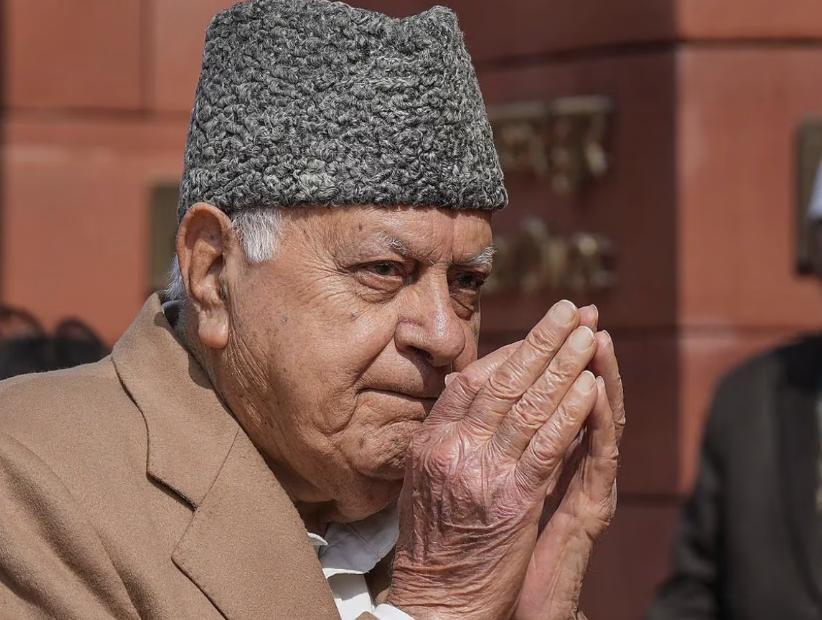
Ex-R&AW chief Dulat claims Farooq privately backed Article 370 abrogation, he denies
The abrogation of Article 370, a contentious issue that has been at the center of political debates in India for decades, has taken a new turn with the claims made by former R&AW chief AS Dulat in his new book ‘The Chief Minister and the Spy’. Dulat, a renowned intelligence expert, has claimed that former Jammu and Kashmir Chief Minister Farooq Abdullah privately backed the abrogation of Article 370. However, Abdullah has denied these claims, terming them as a “figment of imagination”.
In his book, Dulat claims that Abdullah’s National Conference (NC) suggested that the abrogation of Article 370 would have helped in passing the Bill. This revelation has sparked a heated debate, with many questioning the truth behind Dulat’s claims.
For those who may not be aware, Article 370 is a constitutional provision that grants special status to Jammu and Kashmir, allowing it to have its own constitution, flag, and even a separate set of laws. The abrogation of this article was a major move by the Indian government in August 2019, which was met with widespread protests and opposition from various quarters.
Dulat, who served as the chief of Research and Analysis Wing (R&AW) from 1999 to 2000, has a reputation for being a shrewd and experienced intelligence operative. His book, which is based on his memoirs, is expected to provide a unique insight into the workings of India’s intelligence agencies and the country’s political landscape.
However, Abdullah, who was the Chief Minister of Jammu and Kashmir from 1987 to 1990 and again from 2002 to 2005, has strongly denied Dulat’s claims. In a statement, he termed Dulat’s claims as a “figment of imagination” and said that he never supported the abrogation of Article 370.
“I have always stood for the rights of the people of Jammu and Kashmir, and I have never supported the abrogation of Article 370,” Abdullah said. “I am a democrat and I believe in the principles of democracy, and I have always worked to protect the interests of the people of Jammu and Kashmir.”
Abdullah’s denial has been echoed by his party, the National Conference, which has also rejected Dulat’s claims. “The NC has always stood for the rights of the people of Jammu and Kashmir, and we have never supported the abrogation of Article 370,” said a spokesperson for the party.
The controversy surrounding Dulat’s claims has raised several questions about the nature of his relationship with Abdullah and the extent to which he was aware of the former Chief Minister’s views on the issue. While Dulat has claimed that Abdullah privately backed the abrogation of Article 370, Abdullah has denied these claims and said that he never had any such conversation with the former R&AW chief.
The debate surrounding Dulat’s claims has also highlighted the complexities of the issue of Article 370 and the varying opinions on it within the political establishment. While some see the abrogation of Article 370 as a major step towards integrating Jammu and Kashmir with the rest of the country, others see it as a betrayal of the people’s trust and a threat to the constitutional rights of the region.
In the midst of this controversy, it is worth noting that the truth behind Dulat’s claims may never be fully known. While Dulat’s book may provide a unique insight into the workings of India’s intelligence agencies, it is also important to remember that the world of espionage is often shrouded in secrecy and it is difficult to separate fact from fiction.
As the debate surrounding Dulat’s claims continues to unfold, it is clear that the issue of Article 370 and the abrogation of it is likely to remain a contentious issue for a long time to come. While some may see the abrogation of Article 370 as a major achievement for the Indian government, others may see it as a betrayal of the people’s trust and a threat to the constitutional rights of the region.
Ultimately, the truth behind Dulat’s claims may never be fully known, but what is clear is that the issue of Article 370 is a complex and sensitive one that requires careful consideration and debate. As the debate continues to unfold, it is important that all parties involved approach the issue with sensitivity and respect for the rights of the people of Jammu and Kashmir.
Source: https://repository.inshorts.com/articles/en/PTI/5880e3bf-0a05-40d6-887a-465b5c760b3a






